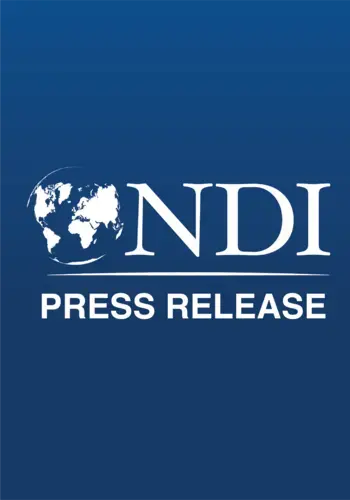Emily Rodriguez, 202-728-5527, [email protected]
Program honors Ambassador Chris Stevens by connecting youth in the Middle East and North Africa (MENA) region and United States
The National Democratic Institute (NDI) announced Jan. 18 the names of civic tech innovators who will be invited to participate in a study mission to Washington, D.C., and Silicon Valley from April 23 to 29, 2017. Sixteen young leaders were selected through a video competition as part of the online Civic Tech Leadership Program, which engaged 200 youth from 14 countries. They include:
Ahmed Galal Elmorshedy from Egypt, Stephen Douglas Wright from the U.S., and Younes Serrar from Algeria, for presenting their project idea BetterVote, an online platform that would combat misinformation and fake news during electoral campaigns in the MENA region by collecting and displaying independently-verified information about candidates, including their policy proposals and campaign finances.
Clara Tsao and Flora Wang from the United States, and Wala Ben Ali from Tunisia, for presenting their project idea Saeduni, an Arabic-language mobile application that would support immigrant victims of domestic violence in the United States by enabling non-native English speakers to safely report domestic abuse and connect with support groups.
Eric Jackson from the United States and Sanad Baja from Libya for presenting their project idea Masahati, a blockchain-based system that would seek to protect the property rights of citizens and businesses in Libya by digitizing land records through a transparent, secure, and multistakeholder blockchain land register.
Adam Zibak from Syria and Awatef Riahi from Tunisia for presenting their project idea Eye on Corruption, an open-source platform that would enable citizens to submit and map anonymous reports of bribery demands, using SMS, smartphones or the web.
Azzen Abidi and Senda Reguei, both from Tunisia, for presenting their project idea: an online platform that would empower people with disabilities in Tunisia by connecting them with providers of essential services such as education and healthcare through a simple, easy-to-use platform.
Ashley Amin, Philip Crehan, and Rachel Gabriel from the United States, and George Philoubos from Egypt, for presenting their project idea, a data collection and visualization tool that would assess the education levels of Syrian refugee children in Jordan, identify access gaps and recommend ‘best fit’ educational programs to aid workers.
The study mission will be the final phase in a leadership program supported by The Aspen Institute’s Stevens Initiative—which increases youth exchange as a tribute to the late Ambassador Chris Stevens—with funding from the U.S. Department of State and Bezos Family Foundation. NDI is implementing the program in partnership with Stanford University’s Center for Democracy, Development and the Rule of Law (CDDRL) and the Institute for Representative Government (IRG), to enable youth in the U.S.and the MENA to learn from and collaborate with each other on addressing public-interest problems through technology.
The most intensive program phase, which ran from Oct. 31 to Dec. 22, was a structured virtual exchange in which teams of participants—who were usually thousands of miles apart and often speaking different languages—worked together to develop ideas for technologies that would target and advance a public good. After connecting with peers, expert mentors, and guest speakers during a seven-week period, 29 teams produced short, bilingual video pitches as their final projects. The videos honored by the selection committee can be viewed at CivicTechLeaders.org.
In one program webinar, former members of the U.S. Congress spoke about effective citizen engagement and responded to questions from participants. Speakers included IRG co-Chairs Hon. Phil English, R-PA (House of Representatives 1995-2009) and Hon. Jim Slattery, D-KS (House of Representatives 1983-1995.)
“We had the opportunity to meet these young men and women virtually during a town hall meeting as part of the NDI-led project,” said English and Slattery in a joint statement. “The webinar was a great example of how technology can connect people and create cross-cultural interaction that can lead to real dialogue and understanding. All of the participants impressed us with their energy and awareness, and we congratulate the winning bids on having emerged from an extremely remarkable and competitive field.”
A selection committee reviewed all video submissions and evaluated project ideas on criteria such as the proposed project’s potential for real-world social impact and the inclusion of marginalized populations. The teams who pitched exceptional video submissions were selected to join the study mission to further enhance their skills and networking.
The visit to the U.S. aims to build on participants’ knowledge and exchange experiences from the online portions of the program, which also included Stanford Online’s bilingual Technology for Accountability Lab. During the study mission, participants will connect in person with technologists, policymakers, and elected officials.
NDI is a nonprofit, nonpartisan, nongovernmental organization that has supported democratic institutions and practices in every region of the world for more than three decades. Since its founding in 1983, NDI and its local partners have worked to establish and strengthen political and civic organizations, safeguard elections, and promote citizen participation, openness and accountability in government.
The Stevens Initiative is an international effort to expand access to virtual exchange in order to build global competence for young people in the United States and the Middle East and North Africa. The Initiative is a lasting tribute to Ambassador J. Christopher Stevens, a public servant who dedicated himself to building understanding between people from different countries. The Initiative is housed at the Aspen Institute and is a public-private partnership of the family of Ambassador Stevens, the U.S. Department of State, the Bezos Family Foundation, the MacArthur Foundation, LRNG, Vidyo, Twitter, Microsoft, and the governments of Algeria, Morocco, and the United Arab Emirates.
###

